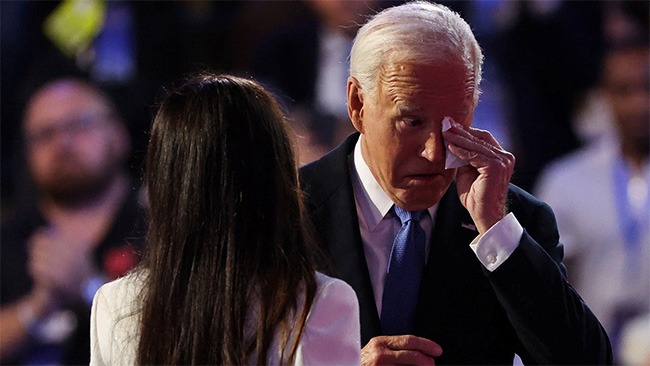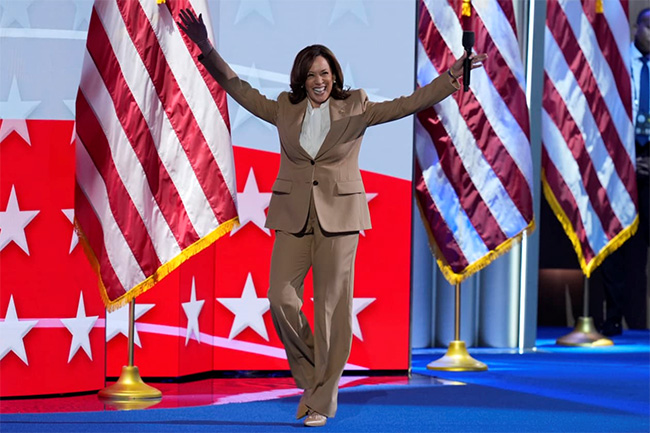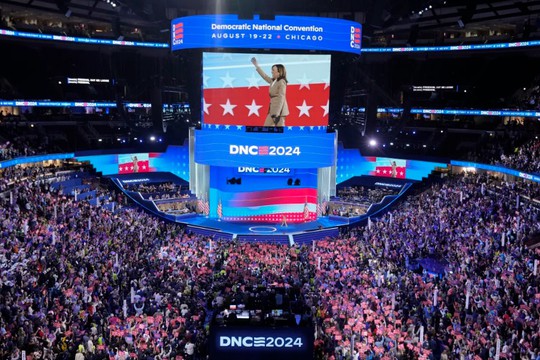Photo: Market Watch TV
The Democratic nominee Kamala Harris made a surprise appearance at the Democratic national convention on Monday night, taking the stage to thank Joe Biden for his service to the country.
“This is going to be a great week, and I want to kick us off by celebrating our incredible president, Joe Biden, who will be speaking later tonight,” she said. “Joe, thank you for your historic leadership, for your lifetime of service to our nation, and for all you will continue to do, we are forever grateful to you. Thank you, Joe!”
Harris, dressed in a tan suit, kept her remarks brief, taking in the enthusiasm from the delegates and convention attenders that were on their feet cheering and chanting.
“Looking out at everyone tonight, I see the beauty of our great nation,” the vice-president said. “People from every corner of our country and every walk of life are here united by our shared vision for the future of our country, and this November, we will come together and declare with one voice, as one people, we are moving forward.
“With optimism, hope and faith, so guided by our love of country, knowing we all have so much more in common than what separates us, let us fight for the ideals we hold dear, and let us always remember when we fight, we win,” she added.
Harris walked out to Beyoncé’s Freedom, which has become her campaign anthem. Beyoncé’s name has been floated by various sources as a potential surprise musical performance at the Democratic convention.
The Democratic Convention kicked off on Monday with fiery speeches from President Biden, former Secretary of State Hillary Clinton and New York Rep. Alexandria Ocasio-Cortez — and surprise remarks from Vice President Kamala Harris. Night one's theme was "For the People."
 Photo: Fox News
Photo: Fox News
The highlight of virtually every political convention is the acceptance speech by the presidential nominee. Standing in a hall before a rapturous audience and millions more watching at home, a potential president has an unobstructed chance to argue the case for their candidacy. But this year is different.
It is 'The Agony and the Ecstasy’ of Joe Biden’s Convention speech, notes POLITICO.
The sheer drama of Monday’s speech by President Joe Biden, following his decision to step aside and cede the nomination to Vice President Kamala Harris after weeks of mounting pressure, is unlike anything ever seen. At any other convention in history, it’d be a triumphant moment for the president. But every cheer Biden hears, every smile he sees, every fist raised in celebration express enthusiasm for a political future without him.
It’s a bizarre inversion of a typical convention, full of conflicting emotions for the speaker. The happier Democrats look in Chicago, the prouder Biden must be — and the more it must hurt.
Consider what might be going through his mind. He came to the presidency with the grateful thanks of Democrats, having deposed former President Donald Trump from the White House. He arrives in Chicago as the first president since Chester Arthur to be denied the nomination of his party for a second term. (President Lyndon Johnson stepped down in 1968 facing a threat to his nomination, but never formally entered the contest.)
Biden must feel the outpouring of celebration that greeted his replacement, even if it’s accompanied by thanks for his sacrifice, as something of a wound.
It is a sharp contrast to how outgoing presidents are usually greeted at a convention. Think of Ronald Reagan, Clinton, Obama, each of whom was greeted at the convention by adoring delegates.
But for the political figure who emerged on the national stage at age 29, who has focused on the goal of the presidency for half a century, who was looking to another term as vindication, his appearance Monday night seems less a celebration and more of a torment.
 Photo: Market Watch TV
Photo: Market Watch TV
Kamala Harris says her campaign is ‘For the People’. The problem is that the phrase, a longtime favorite of prosecutors, has a divisive and troubled history. Harris, and all of the candidates, should aim to expand their visions of who is worthy of representation: As presidential hopefuls, they should aspire to represent us all, stresses ‘The Nation’.
Kamala Harris launched her presidential campaign on January 27 with a speech that unveiled her new campaign slogan: “For the People.” Harris made use of this tagline early and often, wielding it as a clever link between the present and the past — between her current aspiration to represent the people of the United States as president and her long public career, about which, she said, “My whole life, I’ve only had one client: the people.” This claim to represent “the people” is not unusual for a career prosecutor — Harris was both a local district attorney and California’s state attorney general, and California is one of several states that officially designates the prosecution as “the People” in criminal court. But it is a deeply misguided claim — one that misunderstands the role of a prosecutor and risks undermining any larger goal of fighting mass incarceration or reforming the criminal-legal system.
When a prosecutor stands up in court and calls herself “the People” in the same sentence that she requests that an individual person be given a criminal record, or separated from their family and loved ones by jail or prison, that naming of “the People” cements in our minds the problematic idea that individuals who are prosecuted are not part of the people who matter when it comes to politics. Nor are their loved ones and supporters.
We should abandon the idea that prosecutors act “for the People,” eliminating it from formal case captions and colloquial speech alike. Instead, it is more honest to designate prosecutors as “the State,” “the Commonwealth,” or “the Government”: they are state actors, wielding their state power to prosecute individual defendants.
So, what should Kamala Harris do?
By all means, she should aspire to be a presidential candidate who acts “for the people” at all times. But she should also recognize that she did not represent all people when she was a prosecutor. Indeed, she has come under fire for her overzealousness in contributing to mass incarceration as a prosecutor, including by withholding exculpatory evidence, challenging the release of those exonerated for wrongful convictions, and remaining silent on state reform efforts to reduce sentences and decriminalize marijuana, all while defending the state’s draconian three-strikes law.
In short, Harris made many people’s lives much harder and crueler, even if she did so “for the People,” ‘The Nation’ concludes.
read more in our Telegram-channel https://t.me/The_International_Affairs

 11:34 22.08.2024 •
11:34 22.08.2024 •























